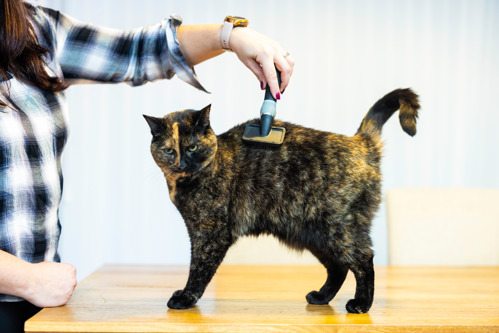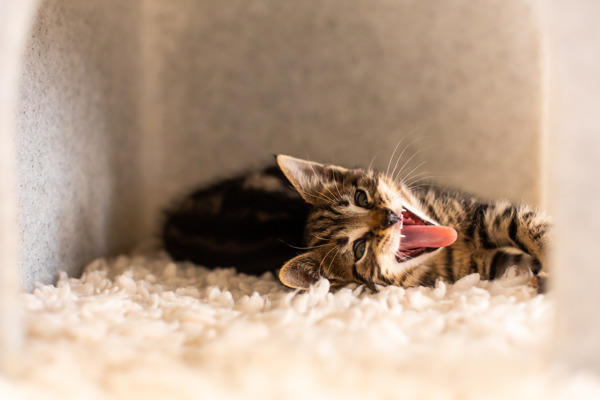Vet experts explain how to wash and shampoo a cat safely to get them clean
The good news is that there usually isn’t any need to bathe a cat. Cats are very clean creatures and are good at grooming themselves. They lick their fur with their tongue to remove any dirt, debris and excess hair. This keeps their coat in good condition. Some cats may need a bit of help with grooming, especially if they have long hair. Long-haired cats should be brushed daily. Short-haired cats should ideally be brushed once a week.
Regular bathing can be harmful for a cat. Bathing can strip their coat of natural oils which are needed to promote skin health and add a layer of waterproofing. If you are using topical flea treatments, you may risk removing these during bathing. Bathing is also a stressful experience for most cats as they don’t like water or having certain areas of their body rubbed and touched.
Wondering whether you should bathe your cat? Registered Veterinary Surgeon Sarah Elliott answers common question about shampooing cats.

How often should you wash your cat?
You should only bathe your cat if your vet has recommended it. Most cats won’t need regular bathing as they are good at keeping themselves clean. Cats usually only need to be washed for specific health reasons. Speak to your vet for advice on whether your cat needs a bath. They will be able to advise you on how often to wash your cat.
Do hairless cats need baths?
Many hairless cats, such as Sphynx cats, will need regular baths to keep their skin healthy. Their lack of fur means they are more prone to developing skin conditions such as bacterial folliculitis and Malassezia dermatitis. Medicated shampoos are usually needed, which are available from your vet on prescription. Talk to your vet about how often your hairless cat needs a bath. Each cat will have their own individual needs. Overbathing can cause the skin to get excessively dry. Your vet will be able to tell you whether any skin products are recommended to avoid the skin becoming too dry.
How to wash a cat
If your vet advises that your cat needs a bath, follow our step-by-step guide on how to bathe your cat safely.
- Fill a sink or tub with warm water. Don’t fill to any higher than the top of your cat’s legs. Do not submerge your cat in water.
- Place a towel on the bottom of the sink or tub to prevent slipping. This will help your cat feel more stable.
- Use a cat-specific shampoo. Stand your cat in the water and place the shampoo on a soft, wet cloth. Gently sponge the fur until they are clean.
How to dry a cat after a bath
- Place your cat on a dry towel.
- Use another soft, dry towel to gently pat and rub the fur. Make sure to gently dry between their toes.
- Provide clean, dry bedding somewhere warm and draft-free. Let them retreat there and finish drying safely.
Should you bathe a kitten?
Very young kittens under eight weeks old should not be bathed as there is a risk they could drown. If you need to wash a young kitten, follow these simple steps:
- Apply a gentle, cat-specific shampoo to a damp cloth.
- Gently and quickly wipe their fur with the cloth until they are clean.
- Keep them warm so they continue to dry.
Alternatives to bathing your cat

If your cat is unwilling to be washed or really hates water, here are a few things you can try.
- Brushing. You may be able to remove dirt and debris from their fur with a brush.
- A damp cloth. If a dry brush won’t do it, try wiping your cat’s fur with a soft, damp cloth.
- Speak to your vet. If you’re still struggling to wash your cat, speak to your vet. They may be able to bathe them for you.
Can you use dog shampoo on cats?
You should not use dog shampoo on cats. Cats and dogs have different skin. Cats are more sensitive to chemicals, essential oils and fragrances found in dog shampoos. They can cause allergic reactions or skin irritations. Some dog shampoos, such a flea shampoos, also have certain ingredients, such as permethrin, that are toxic to cats. You should also avoid using human shampoo on your cat. Speak to your vet about the best shampoo to use on your cat.



